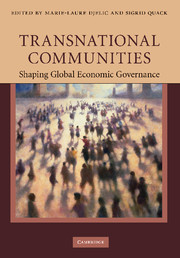Book contents
- Frontmatter
- Contents
- List of figures
- List of tables
- List of appendices
- Contributors
- Preface
- Part I Introduction
- Part II Classical communities with a transnational extension
- Part III Professional communities with a transnational extension
- 5 Transnational boards and governance regimes: a Franco-British comparison
- 6 Private equity in Japan: global financial markets and transnational communities
- 7 Formal organizing and transnational communities: evidence from global finance governance associations, 1879–2006
- 8 Promoting transnational professionalism: forays of the “Big Firm” accounting community into France
- Part IV Virtual communities
- Part V Transnational interest- or issue-based communities
- Part VI Conclusion
- Index
- References
7 - Formal organizing and transnational communities: evidence from global finance governance associations, 1879–2006
Published online by Cambridge University Press: 07 September 2010
- Frontmatter
- Contents
- List of figures
- List of tables
- List of appendices
- Contributors
- Preface
- Part I Introduction
- Part II Classical communities with a transnational extension
- Part III Professional communities with a transnational extension
- 5 Transnational boards and governance regimes: a Franco-British comparison
- 6 Private equity in Japan: global financial markets and transnational communities
- 7 Formal organizing and transnational communities: evidence from global finance governance associations, 1879–2006
- 8 Promoting transnational professionalism: forays of the “Big Firm” accounting community into France
- Part IV Virtual communities
- Part V Transnational interest- or issue-based communities
- Part VI Conclusion
- Index
- References
Summary
Introduction
The global economic, political, and social landscape underwent a remarkable transformation in the latter half of the twentieth century (Giddens 1984, 1990; Hirst and Thompson 1996; Boli and Thomas 1999; Drori et al. 2003; see also Foucault 1970, 1979 on general epistemic shifts). These changes had an impact on many aspects of economic and social life. One of the most profound developments has been the proliferation of transnational organizing through formal structures. The extraordinary growth in global voluntary associations, in particular, and the timing of the emergence of these associations in the global sphere have not been adequately explained by existing theories in organizational analysis and other social sciences. Therefore, an alternative theoretical approach is required to understand how and why associational forms of organization of economic and social activity have moved into the transnational space.
In this chapter we shall address these concerns by looking at the historical emergence of global finance governance associations and note the existence of archipelagos of agencies that govern finance in different ways. These voluntary associations include legally incorporated associations that exist within local legal jurisdictions as well as loosely structured networks and movements that are disembodied entities that exist and coordinate using electronic media. Incorporated associations display local rootedness with implications such as legal liability of its members, the right to own property and enter contracts, and the right to open a bank account and officially lodge a complaint.
- Type
- Chapter
- Information
- Transnational CommunitiesShaping Global Economic Governance, pp. 153 - 173Publisher: Cambridge University PressPrint publication year: 2010
References
- 5
- Cited by



